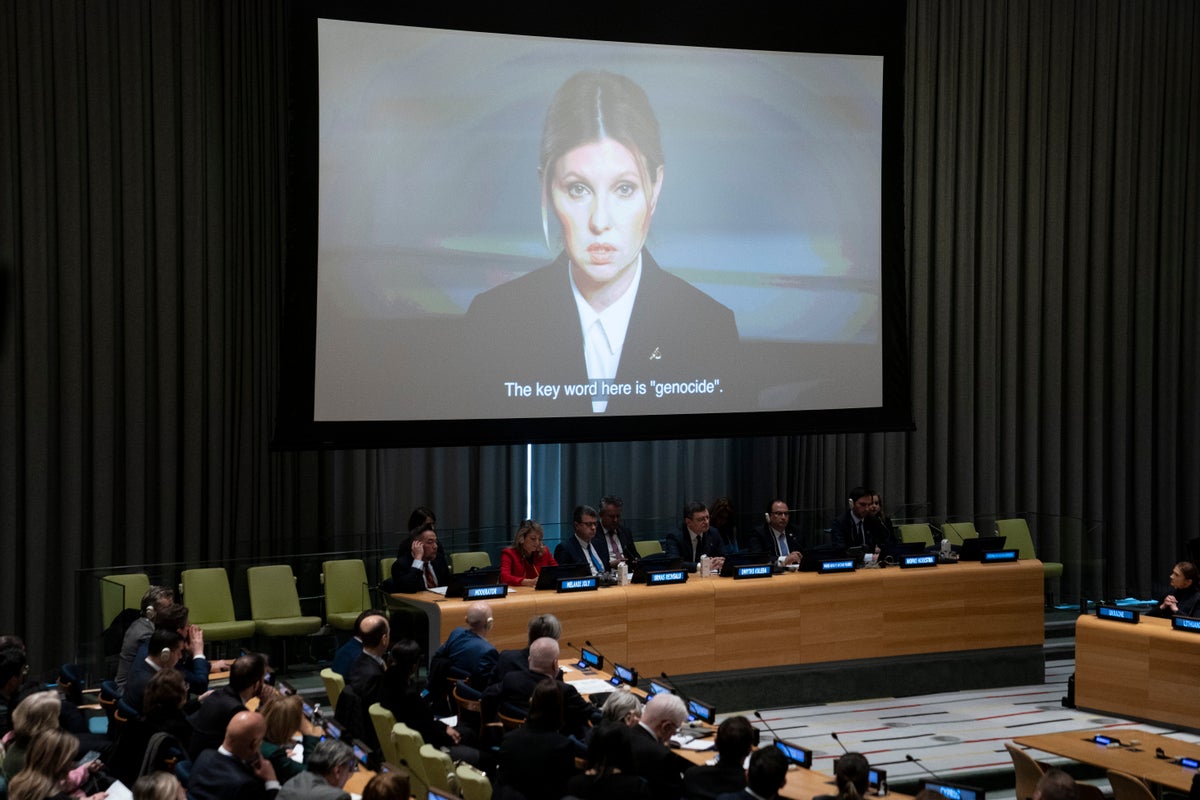
Ukraine’s First Lady Olena Zelenska gave a video tour of human rights violations in the country following Russia’s invasion almost a year ago, telling a U.N. meeting Wednesday: “We have the right to live free, not to be killed or tortured.”
She showed destruction in the eastern frontline city of Bakhmut, which Russia is trying to capture, where shelling is killing civilians and water is scarce; the mass graves of Ukrainians left behind after Russian occupiers left the city of Izium; the Kramatorsk train station, which was hit by a missile killing 50 people and wounding dozens more trying to flee the war; and many other examples.
At a meeting on “Gross Human Rights Violations Due To The Aggression Against Ukraine” organized by the Kyiv government, Zelenska also pointed to ill-treated emaciated Ukrainian prisoners of war, and the thousands of children Russia has taken from Ukraine and the reported adoption of some of them by Russian families.
“We are fighting for human rights,” she said, speaking virtually. “We are fighting for what unites us, the right to freedom, life, not to get tortured and to live freely.”
The wife of President Volodymyr Zelenskyy stressed that Ukraine’s victory in the war will mean the victory of human rights over “lawlessness, torture and destruction.”
She called on the United Nations to establish a special tribunal to prosecute crimes of Russian aggression, stressing that “it is not only us who need that, we need that for everyone.”
“Justice for Ukraine is justice for the entire world," Zelenska said.
International pressure has been mounting for a special tribunal to be established to prosecute the crime of aggression. The European Union’s legislature passed a non-binding resolution in January calling on the 27-nation bloc to work “in close cooperation with Ukraine to seek and build political support in the U.N. General Assembly and other international forums ... for creating the special tribunal for the crime of aggression against Ukraine.”
The International Criminal Court, which has a mandate to prosecute war crimes, crimes against humanity and genocide, has opened an investigation into crimes committed in Ukraine. But it does not have jurisdiction to prosecute Russia’s leaders for aggression.
Netherlands Foreign Minister Wopke Hoeksta told the meeting that Russia’s crimes are piling up a year after its Feb. 24, 2022 invasion, pointing to “child abductions, sexual violence, torture, the shelling of schools, hospitals and houses, the destruction of entire neighborhoods.”
He said the Netherlands is taking a leading role in ensuring justice for the people of Ukraine and the quest for accountability which requires “watertight evidence.”
Hoeksta announced that the Netherlands is sending two more forensic investigation missions to Ukraine to collect evidence and urged all countries that are parties to the International Criminal Court to contribute to this effort.
He said the Netherlands also strongly supports establishment of an International Center for the Prosecution of the Crime of Aggression “to collect evidence that can be used to eventually try Russian leadership.” He said it should be based in The Hague, the Dutch city that is also the headquarters of the ICC and the International Court of Justice, the U.N.’s highest court.
“We must do all we can to prevent further injustice,” Hoeksta said. “There can never be peace in a world where crime and brute force prevails over justice.”







